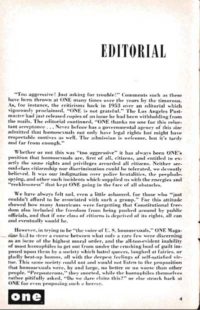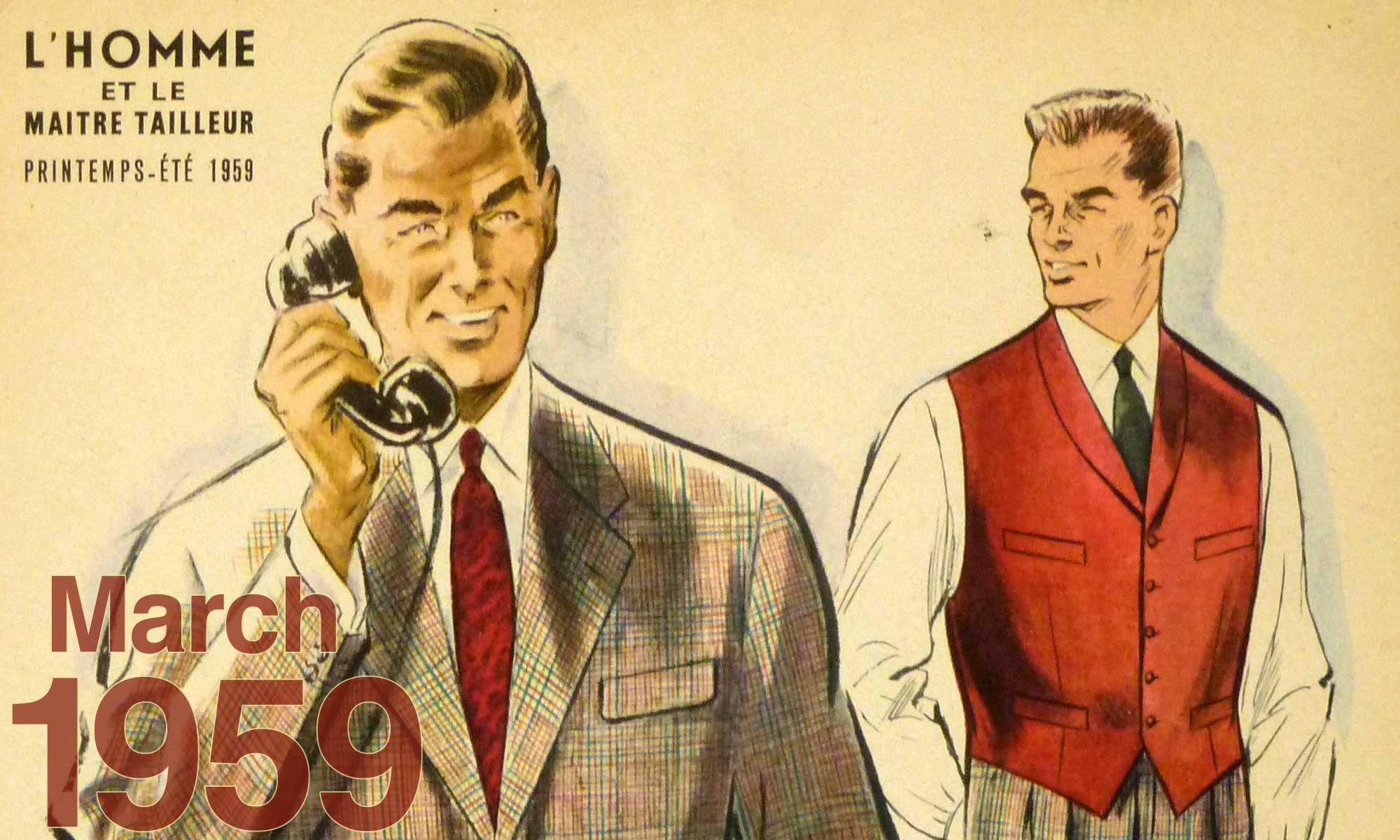| ◄ MARCH ► | ||||||
|---|---|---|---|---|---|---|
| ◄ 1959 ► | ||||||
| 1 | 2 | 3 | 4 | 5 | 6 | 7 |
| 8 | 9 | 10 | 11 | 12 | 13 | 14 |
| 15 | 16 | 17 | 18 | 19 | 20 | 21 |
| 22 | 23 | 24 | 25 | 26 | 27 | 28 |
| 29 | 30 | 31 | ||||
| President: | Dwight D. Eisenhower (R) | |||
| Vice-President: | Richard M. Nixon (R) | |||
| House: | 282 (D) | 152 (R) | 1 (Other) | 1 (Vacant) |
| Southern states: | 100 (D) | 6 (R) | ||
| Senate: | 64 (D) | 34 (R) | ||
| Southern states: | 22 (D) | |||
| GDP growth: | 9.2 % | (Annual) | ||
| 2.4 % | (Quarterly) | |||
| Fed discount rate: | 2½ % | |||
| Inflation: | 0.4 % | |||
| Unemployment: | 5.6 % | |||
 March: ONE magazine asks, “When will homosexuals stop pitying themselves?” Unlike the leadership of the Mattachine Society under Hal Call, The editors and writers for ONE often staked out forward-leaning positions in the pages of the magazine. Some feared that ONE was too aggressive and was just asking for trouble. ONE’s board chairman Dorr Legg (who went by the name of William Lambert), pushed back in an editorial: “Whether or not this was ‘too aggressive’ it has always been ONE’s position that homosexuals are, first of all, citizens, and entitled to exactly the same rights and privileges accorded all citizens. Neither second-class citizenship nor discrimination could be tolerated, we devoutly believed. It was our indignation over police brutalities, the peephole spying, and other such incidents which supplied us with the energies and ‘recklessness’ that kept ONE going in the face of all obstacles. … When are American homosexuals going to stop sitting around pitying themselves, excusing themselves, hiding their faces and bemoaning their lot? When are they going to roll up their sleeves and do some of the hard work and the fighting that any segment of society must do to defend its own rights.”
March: ONE magazine asks, “When will homosexuals stop pitying themselves?” Unlike the leadership of the Mattachine Society under Hal Call, The editors and writers for ONE often staked out forward-leaning positions in the pages of the magazine. Some feared that ONE was too aggressive and was just asking for trouble. ONE’s board chairman Dorr Legg (who went by the name of William Lambert), pushed back in an editorial: “Whether or not this was ‘too aggressive’ it has always been ONE’s position that homosexuals are, first of all, citizens, and entitled to exactly the same rights and privileges accorded all citizens. Neither second-class citizenship nor discrimination could be tolerated, we devoutly believed. It was our indignation over police brutalities, the peephole spying, and other such incidents which supplied us with the energies and ‘recklessness’ that kept ONE going in the face of all obstacles. … When are American homosexuals going to stop sitting around pitying themselves, excusing themselves, hiding their faces and bemoaning their lot? When are they going to roll up their sleeves and do some of the hard work and the fighting that any segment of society must do to defend its own rights.”![]() Mar 3: American comedian and actor Lou Costello dies of a heart attack just three days before his 53rd birthday.
Mar 3: American comedian and actor Lou Costello dies of a heart attack just three days before his 53rd birthday.
![]() Mar 4: Cuba nationalizes the Cuban Telephone Company, a subsidiary of ITT.
Mar 4: Cuba nationalizes the Cuban Telephone Company, a subsidiary of ITT.
![]() Mar 6: The Federal Reserve Board raises the discount rate from 2½ to 3% in an effort to decrease the prospects of rising inflation. The move comes as a surprise, with inflation remaining low and some 4.7 million people still out of work in the aftermath of the worst recession since World War II.
Mar 6: The Federal Reserve Board raises the discount rate from 2½ to 3% in an effort to decrease the prospects of rising inflation. The move comes as a surprise, with inflation remaining low and some 4.7 million people still out of work in the aftermath of the worst recession since World War II.
![]() Mar 9: The Barbie doll debuts at the American International Toy Fair in New York City.
Mar 9: The Barbie doll debuts at the American International Toy Fair in New York City.
![]() Mar 9: Frankie Avalon’s single “Venus” begins its five week run at the top of the charts.
Mar 9: Frankie Avalon’s single “Venus” begins its five week run at the top of the charts.
![]() Mar 10: A rebellion breaks out in Tibet as 30,000 Tibetans surround the Dalai Lama’s palace, the Norbulingka, to prevent his arrest by the Chinese government.
Mar 10: A rebellion breaks out in Tibet as 30,000 Tibetans surround the Dalai Lama’s palace, the Norbulingka, to prevent his arrest by the Chinese government.
![]() Mar 11: Lorraine Hansberry’s play A Raisin In the Sun opens on Broadway at the Ethel Barrymore Theatre.
Mar 11: Lorraine Hansberry’s play A Raisin In the Sun opens on Broadway at the Ethel Barrymore Theatre.
![]() Mar 28: The People’s Republic of China abolishes the government of Tibet under the Dalai Lama. China installs a puppet government under the Panchen Lama.
Mar 28: The People’s Republic of China abolishes the government of Tibet under the Dalai Lama. China installs a puppet government under the Panchen Lama.
![]() Mar 29: The film Some Like It Hot, starring Marilyn Monroe, Tony Curtis and Jack Lemmon, is released.
Mar 29: The film Some Like It Hot, starring Marilyn Monroe, Tony Curtis and Jack Lemmon, is released.
![]() Mar 30: The Dalai Lama flees Lhasa in Tibet and finds sanctuary in India.
Mar 30: The Dalai Lama flees Lhasa in Tibet and finds sanctuary in India.
![[Emphasis Mine]](http://jimburroway.com/wp-content/uploads/2018/01/DoBFounders.jpg)
